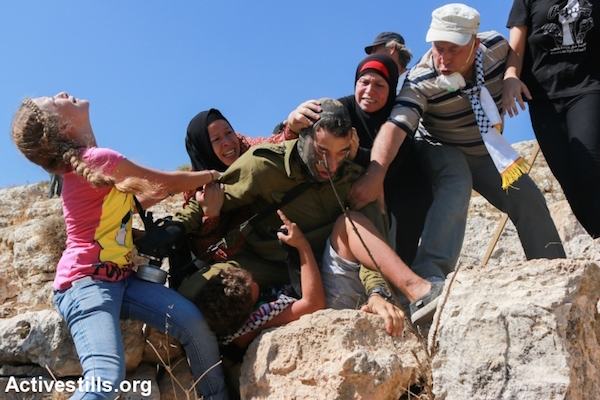The response in Israel to an attempted arrest of a minor in the West Bank village has been fierce yet predictable. Wrapped up in outraged reactions to the treatment of the soldier himself, however, is Israel’s bruised sense of entitlement.

An Israeli soldier’s attempted arrest of a Palestinian minor in Nabi Saleh last Friday, and its prevention by the child’s family, have generated heated reactions in Israel. Responses have ranged from outrage at the soldier’s treatment to calls for increased and harsher powers for Israeli security forces in the West Bank, along with the customary slew of “Pallywood” slurs that accompanies any photo or video evidence of misbehavior by Israeli forces. Only in a few isolated corners did the question arise of whether it is reasonable or decent for an armed soldier to chase and pin down an injured child.
The Israeli media, somewhat predictably, largely reported the incident in line with the IDF’s description of the episode and failed to place it within the context of the occupation. Much was made of the fact that this was not the first time the Tamimi family has been in the news, accompanied by suggestive commentary about Palestinians being canny wielders of the media weapon. There seems to have been little consideration of the fact that what is caught on camera simply gives the barest hint as to what goes on behind closed doors, or that the video camera might be a legitimate non-violent weapon in the struggle against military occupation.
In a Facebook post about the incident, Minister of Culture and Sport Miri Regev expressed her shock at the soldier’s treatment, writing that “anyone who tries to harm an Israeli citizen or IDF soldier should know that his blood is on his head.” She further called on the defense minister to “put an end to the humiliation and change the open-fire regulations immediately!”
Yisrael Beitenu chairman Avigdor Liberman, who since his resignation from the cabinet has largely focused on taking potshots at Bibi from the sidelines, took the opportunity to do so again. Accusing Netanyahu and Defense Minister Ya’alon of failing to back the Israeli soldiers, Liberman lamented the damage done to the IDF’s “deterrent power,” and claimed that the incident showed the “weakness and impotence of the IDF and Israel.”
Elsewhere on social media, Manal Tamimi — a relative of Mohammed Tamimi, the boy the soldier tried to arrest — received a threat the day after the incident that a “price tag” arson attack would be carried out on her home. A comparative picture has also been making the rounds claiming to show Mohammed on the same day with his other arm in a cast, an attempt to mark this as “another Pallywood production.” Those posts failed to acknowledge the fact that the second photo was taken nearly a year and a half ago (and indeed, shows Mohammed in a completely different set of clothes).
In the Tel Aviv suburb of Ramat Gan, parents demanded that a teacher there be fired because he was caught on camera at the protest that day in Nabi Saleh. Although the teacher was filmed being aggressively pushed by a soldier (not the one who tried to arrest Mohammed Tamimi), the mayor of Ramat Gan nonetheless announced that “[t]here is no place for a person who attacked Israel Defense Forces soldiers in the education of our city’s children.” Several members of the Jewish Home party also called for the teacher’s dismissal, while Education Minister Naftali Bennett told Israel’s Channel 10 news that he “expect[s] a teacher of the State of Israel to be loyal to the State of Israel.” Right-wing news site 0404 has been leading a witch-hunt of sorts against the teacher.
The day after the incident, the IDF filed a complaint with Israeli police against some of the Palestinians filmed in the now-famous video, as did a reserve soldier after watching online footage of the aborted arrest. In response, police announced that “the attackers are known and will be arrested soon.” Nariman and Bassem Tamimi, Mohammed’s parents, were briefly detained at the entrance to Nabi Saleh on Tuesday before being released and sent back into the village.

Entitlement and occupation
The video-taped attempted arrest in Nabi Saleh and the reactions to it demonstrate more than just a lack of imagination and unwillingness to put violence against Palestinians in context. Rather, the overall impression is of wounded pride. More than anything, the responses demonstrate Israel’s galloping sense of entitlement at work once again.
The soldier clearly believed he was entitled to aggressively manhandle a minor with a broken arm and Miri Regev believes he should have been entitled to shoot the unarmed crowd trying to pull him away. Regev’s cropping of the child from the illustrative photo she posted on Facebook is particularly indicative. Either even she is vaguely aware of the negative implications of an armed Israeli soldier sitting on top of a visibly minor, visibly injured child, or – and this is far more likely — she simply doesn’t believe it is at all relevant to the boy’s relatives trying with all their might to unearth him.
Liberman believes that not acting on such entitlements makes Israel look weak. Indeed, his primary concern seems to be with the damage this episode will do to Israel’s image – not because it suggests inhumanity but because it suggests “impotence.” The lack of self-awareness here, based entirely on how impressive one looks to others, is pure narcissism – of which entitlement is a primary symptom.
Parents believe they are entitled to demand that a man lose his livelihood, because he is filmed not supporting the violent arrest of a minor; Ramat Gan’s mayor evidently believes in such entitlement, too.
Underscoring all of this is the ultimate object of Israel’s sense of entitlement — land. The ruling coalition, along with huge swathes of Israeli society, believe that they are entitled to every patch of land between the river and the sea – and as a result, are entitled to react however they deem necessary to those who might stand in their way, whether it is the Palestinians whose land they are trying to take or the Israelis and internationals who support them.
For that is the thing about a sense of entitlement – it’s a slippery slope. It leads people to pursue that which is not necessarily theirs and fosters an attitude in which the end always justifies the means. The episode at Nabi Saleh on Friday, along with the majority of Israeli reactions to it, encapsulate the warped values that inevitably arise from a sense of entitlement that is allowed to flourish unchecked.


